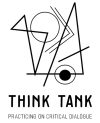Part of our methodology is to engage in dialogue and actively listen to people from diverse perspectives, conduct thorough research, and avoid escalating competitive strain among marginalized communities.There is a conflict of arguments, however, we recognize that there may be instances where our discourse inadvertently hurts or traumatizes some groups.In such cases, we are committed to self-reflection and examining our position through collaborative efforts, ensuring that we continually engage in conversations and collaborative learning to align our perspective.
As we understand it, a think tank is an evolving space that continually produces and evolves opinions, interpretations, and political stances. It is important for us to be honest and open about our decision to expand and reframe our manifesto. This goes beyond a mere name change for us; it is a testament to our commitment to democratic principles, our willingness to accept criticism, and our dedication to learning from past experiences in order to deepen our knowledge.
Regarding the use of the word “Ambaradan,” the word is used quite commonly in the Italian language to express chaos and it burdens some negative connotations, we acknowledge the need to critically examine how Italy’s colonial past reflects in sociological discourses. Therefore, in this context, we have decided to discontinue the use of “Ambaradan” as our name.
Building an enhanced area that fosters dialogue has been our key objective from the very beginning.We believe that the term “al muKHhatab” encapsulates our perspective as a think tank.
Additionally, we would like to express our sincere gratitude to our previous round table guests. We have learned valuable insights from their contributions, particularly in navigating the institutional landscape surrounding artistic and anthropological subjects. Their assistance has been instrumental in our growth and understanding.
NEWSLETTER
Sign up to receive notices about upcoming events, updates, publications, and other progress. Max 1 message per month
